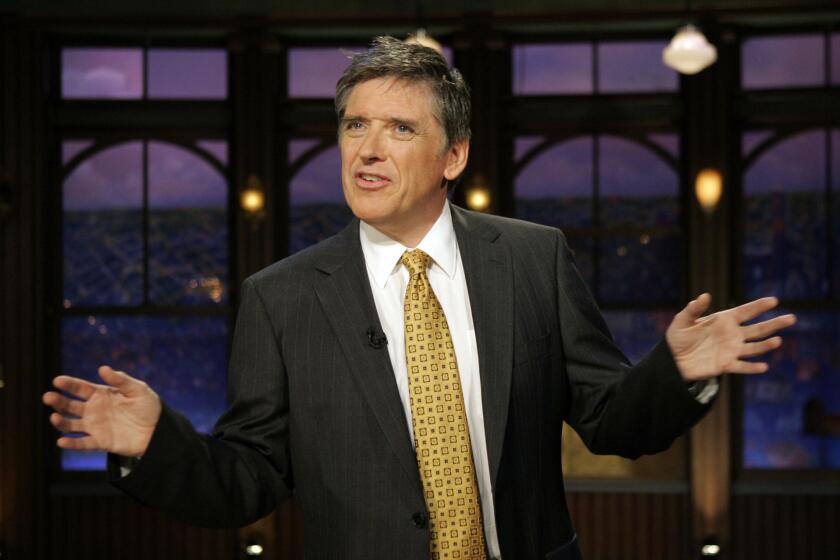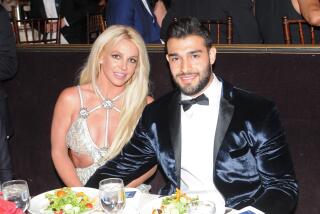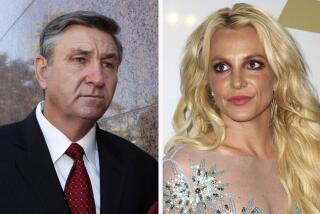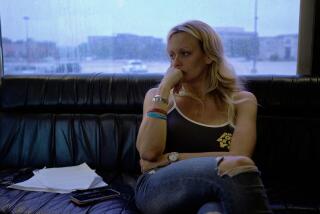The ‘Britney’s Gram’ podcast began as a lark. #FreeBritney wasn’t part of the plan
- Share via
In 2017, Tess Barker and Barbara Gray launched a podcast, “Britney’s Gram,” dedicated to humorously dissecting Britney Spears’ enigmatic Instagram account. And then #FreeBritney took flight.
The hashtag’s transition into a bona-fide movement — made up of fans advocating for the singer to be released from the conservatorship she’s been under for nearly 13 years — took shape after the pair released a special podcast episode in 2019 featuring a troubling voicemail from someone who claimed to be a former paralegal for a lawyer who worked on Spears’ conservatorship.
The fan-driven campaign is a through line in the much-discussed documentary “Framing Britney Spears.” Part of FX’s “The New York Times Presents” documentary series, the film traces the pop star’s rise to fame and the controversial conservatorship she was placed under after suffering a public breakdown in 2007-08, and which she is currently battling in court.
But just as the documentary scrutinizes the tabloid culture of the early aughts, the film and the wave of coverage around it — including in The Times — have led some to wonder whether the press has simply created yet another Spears frenzy. In particular, “Framing Britney Spears” has come in for criticism for its credulous treatment of the #FreeBritney movement that “Britney’s Gram” helped unleash.
Barker and Gray spoke with The Times about the comic origins of “Britney’s Gram,” the future of the podcast and grappling with their own role in an often toxic celebrity culture. The following conversation has been condensed and edited for clarity.
Applying the rigor of “Frontline” to the story of her conservatorship, “Framing Britney Spears” is a pointed work of criticism aimed at celebrity culture.
“Framing Britney Spears” really highlights the invasive media frenzy — and its built-in misogyny — that surrounded Spears and contributed to her struggles. What’s your take on some of the mea culpas that have emerged in the days since?
Gray: It’s something we’ve been considering this entire time. We are around Britney’s age, so we were a byproduct of that in our own way — just kind of seeing it being played out in front of us. I think a lot of people’s reaction is, “We didn’t even realize how bad it was until you see it put right in front of you, and it’s really horrifying.” And it was not that long ago. We all grew up with that in our eyeballs every single day. It’s really nice that there’s so much reckoning going on and that people are really kind of seriously taking the conversation to heart. And actually looking at her story as an example of how we’ve failed her and, I think, failed a lot of women.
Barker: It’s been refreshing to see the mea culpas from all the media outlets, but I think in cases like this, it’s always important to be mindful that there’s an appetite with the general public that creates that market. I think you have seen the people [who] consume that media also feeling a sense of responsibility and a sense of a need to apologize to Britney.
You launched “Britney’s Gram” in 2017 after a post on Spears’ Instagram page of her painting outside. What was your goal and aim with the podcast and how did that shift as you started to play closer attention?
Gray: At that point, we were looking at them with a more innocent view. We knew about the conservatorship, but not in much detail. So we would look at them and think, “Oh, these are interesting. She’s basically posting memes that your aunt would post on Facebook, but it’s Britney Spears.” I have a picture at a friend’s baby shower of all of us looking at a new one, because it was always a fun topic of conversation.
Barker: The comedy of the podcast, we thought, would derive from us taking something so mundane incredibly seriously. So we really intended it to be, maybe not quite satire, but a comedic kind of take, because we thought, “How ridiculous to do a deep dive on someone’s Instagram feed.” But the New York Times had done a great expose back in 2016, sort of questioning the necessity of the conservatorship. And so we did start the podcast after that article. I think our audience was aware to a certain extent of the questionable nature of the conservatorship. And I think we didn’t know it yet, but there was a certain je ne sais quoi in those posts that drew us in. We didn’t know what we were looking at yet, but something was off. And I think that is sort of what compelled us to examine it so closely.
The podcast — at least I’ll speak for me — felt like some of the conversations I would have friends. We’d share posts in our group chat and try to understand the randomness of it all. And then you think about the memes that would be like: “If Britney survived 2007, we can survive this.” Did you find yourself reflecting on, “Wait, what is my role in all this?”
Barker: Absolutely. We found ourselves reflecting on that and yeah, like Barb said, it was a comedy podcast, so we would be ripping and we’d be silly. And like you said, we wanted it to have that feeling of just girls at brunch, talking about Britney’s Instagram. But we just didn’t understand the gravity of the situation. And we weren’t fully versed on what conservatorships were. We never would have taken that tone if we knew there were possible human rights violations going on.
Gray: I’ve been thinking it about a lot lately, because people are like, “What do you want to come out of this?” And it seems when you look at old interviews of Britney and stuff like that — this one was specifically in the documentary where they were, like, “Oh, you’re a dancer or you’re a singer.” And she’s like, “I mean, that’s my job. I’m really a mom.” And from what I can tell from interviews and stuff, I think that’s what she wants. And so to me, God, I wish for her and for so many people, we could just treat them like a human being who deserves to be able to walk down the street and not be hounded. Whether that’s by media or fans. I hope that it leads to another conversation about just letting people live their lives.
Britney Spears’ 2007 head-shaving incident spurred a memorable monologue on “The Late Late Show With Craig Ferguson.”
We see in the documentary the moment where things shifted and led to the #FreeBritney movement, which is when you got that voicemail.
Gray: The first [time], it was, like, Tess went to a hearing by herself, and there was one other reporter there or two other reporters there. And then the first rallies and stuff didn’t happen really until after the voicemail. So the voicemail came out, [and] we had a West Hollywood rally just randomly — 20, 30 people maybe. And it just grew from there. I mean, I think the first push of it was just that this confirmed for so many people who’ve been paying attention — it was like, “Oh, OK, this is legit.”
And so the voicemail just solidified this for everybody who was wondering. So if you were already in on it, it was easy to be like, “OK, this is time to take action.” That movement moved into people trying to tell everyone else about it and trying to get the word out there and posting that line and going to the rallies and then you go to the court, and there’s 10 more people this time.
Barker: What happened with the voicemail ... I mean, we’ve been in the entertainment industry long enough that, at this point, I tend to believe rumors that I hear going around for a long time. I think we learned from things like the Bill Cosby situation and the Harvey Weinstein situation. Those are not things that happen overnight. Those were things that they’re whispering about for years. And so that sort of felt like what happened with the voicemail.
I think people who have been paying attention to Britney had their suspicions and had been having these conversations for a long time. And so I think it just kind of galvanized people into action.
Have you ever been contacted by [Spears’ father and conservator] Jamie [Spears] or his attorneys about the podcast or anything?
Barker: No.
Gray: No. We were very aware that that is a thing that could happen. We were scared and expecting it for quite a while and — knock on wood, you know?
There have been a few postings on Britney’s Instagram since the documentary’s release. What’s your take on them?
Gray: To be honest, we don’t analyze the posts as much as we used to, because we’re kind of busy really trying to research everything else that’s going on. So we don’t spend as much time nitpicking them as we used to. I thought the Super Bowl one was interesting. It almost felt like she was trolling a little bit in a funny way. It’s hard to know, because, again, there’s a whole question of, “Does she post these directly? Is she the one writing these?” People don’t really know the answer to that.
Barker: I thought about the one with the “Toxic” video. My take on that was the documentary did a good job of really reminding people what an icon she is and what an impressive career she’s had, so I thought she was kind of riffing off of that and just reminding people like, “Guys, this is who I am — ‘It’s Britney, bitch.’” And then maybe also agreeing with part of what the documentary was saying, which is, this is a real human here. This isn’t just any character. This is a human being.
The thing I’ve been thinking about is: If she gets her freedom, what next? Because there’s no stopping the media frenzy. Is the cycle too big to be broken?
Gray: That’s got to be the media. They’ve got to make that choice to leave her the f— alone. And I hope they do. And I know that’s probably way too much to ask, but that is what I hope.
Barker: In terms of the logistics of what will happen to her, we’ve talked to attorneys at the ACLU and places like that. There are a lot of other options outside of conservatorship that you can give to support someone who might want support in their lives. So I think that’s something that I’d like to see happen for her, if that’s something she wants. I hope that all of these mea culpas from the media and from the fans, I hope that when she does get free, that does make people pause before asking her for a selfie if they see her at Starbucks or asking her for an autograph if they see her somewhere. I hope all of this really does sink into people that this is a person and when you see them, they’re a stranger, just like every other stranger you see out there. You don’t go up to a random person when they’re eating their dinner and bothering them and you shouldn’t do it to Britney Spears.
Gray: And that’s why it’s so complicated, because of course there’s a whole economy there. There’s people that want to read those stories, and we’re all guilty of it still. I was reading something today, I caught myself reading some kind of pop culture news today. And I was like, “Oh no, this is exactly what it’s all wrapped up in.” It’s so part of our culture now. But I’ve been thinking about that a lot, about how we can try to encourage a change there. And it’s like “OK, well, you can say a lot, but where’s your action?”
So what happens from here with “Britney’s Gram”?
Gray: Well, we actually have been working on something for a while that we finally announced. We’re making a serialized investigative documentary podcast with [Stitcher’s] Witness Docs. [“Framing Britney Spears”] was really good, but it was just the beginning. Basically, there’s a lot more, so we’ll dive deeper into all of it.
More to Read
The complete guide to home viewing
Get Screen Gab for everything about the TV shows and streaming movies everyone’s talking about.
You may occasionally receive promotional content from the Los Angeles Times.








